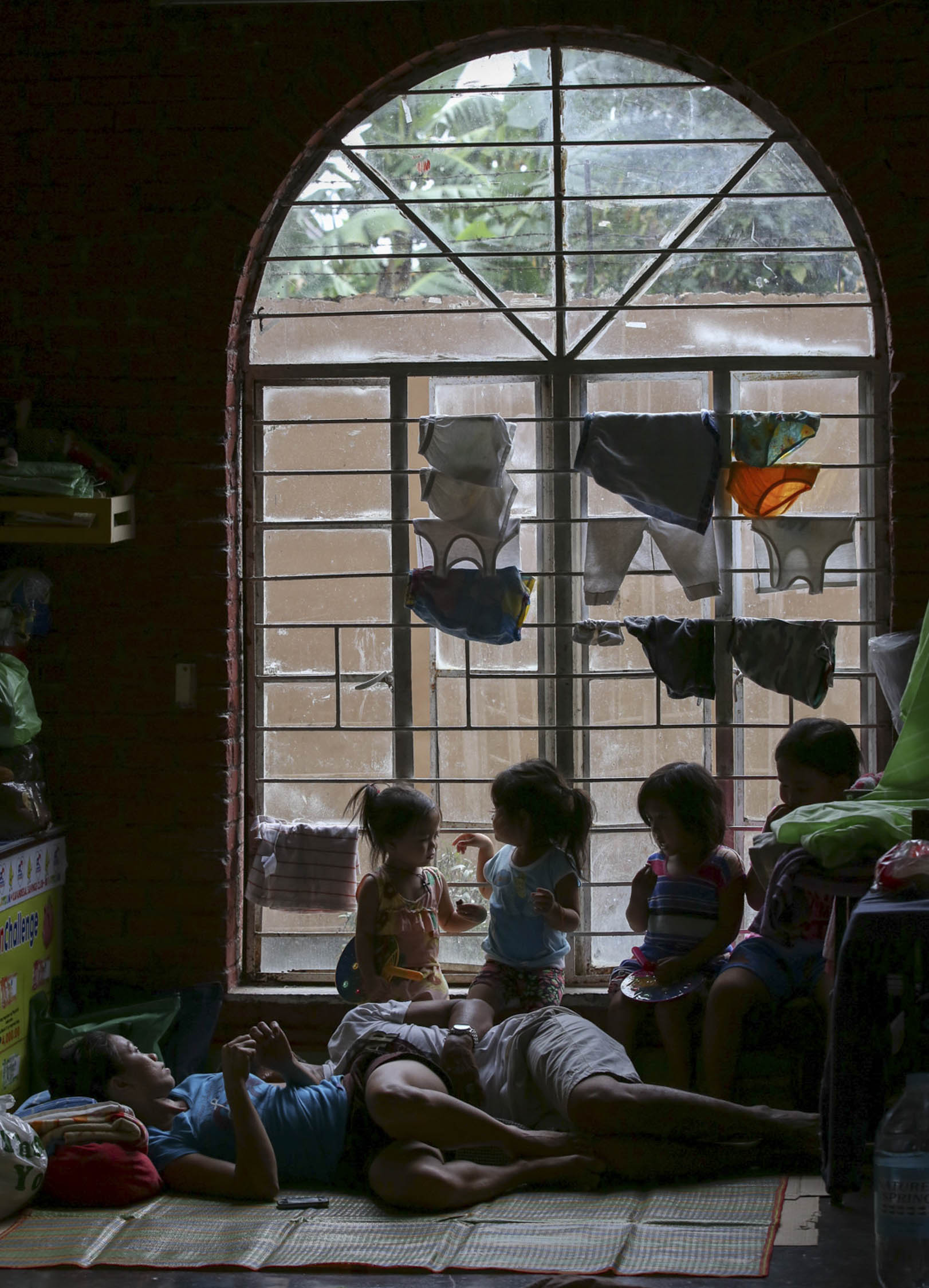DILG shuts down businesses within Taal Volcano danger zone

EVACUEES’ PLIGHT Maricel Capagalan watches her daughter and the children of other evacuees while resting on a mat with her husband inside a classroom at Bauan Technical High School in Bauan town, Batangas province. —LYN RILLON
MANILA, Philippines — The Department of the Interior and Local Government (DILG) on Monday warned businesses in the Taal Volcano danger zone to stop operating or face losing their business permits.
Citing the danger that the volcano could explode any time, the DILG also ordered a halt to the daily visits by residents to their homes in the danger zone to feed their pets and livestock.
The DILG had issued a memorandum banning any commercial activity within the 14-kilometer radius danger zone as long as the alert level on Taal remained at 4, a notch below hazardous explosive eruption.
Hotels, restaurants
But some hotels and restaurants in Tagaytay, a prime tourist destination, reportedly resumed operations during the weekend when Taal appeared to be cooling down.
The Philippine Institute of Volcanology and Seismology (Phivolcs) said earthquakes rocking the region indicated that magma was pushing up from the volcano’s belly and a hazardous explosive eruption could happen any time.
Article continues after this advertisementSpeaking to reporters in Malacañang on Monday, Interior Undersecretary Epimaco Densing III said the DILG would check out the reports, but stressed that the agency had issued the same memo to the Tagaytay City government. Tagaytay is within the danger zone, he said.
Article continues after this advertisement“If they defy the memorandum, again we will order the local chief executive to close them down, cancel their mayor’s permit, their operating permits,” Densing said.
“There are barangays below that need total evacuation. Those in the higher places, in the high side, we told them to stop ope¬rations so that there won’t be any tourists or locals loitering,” he said.
The DILG issued the memo on Tuesday last week after reports came that Taal Vista Hotel continued to operate even though other businesses in Tagaytay had halted their operations.
Safety first“We have to write the mayor telling her, directing her to close it down. If ever Taal Vista did not close down, we would send the [police] there to implement the closure,” Densing said.
“There have been meetings and [the] businessmen are really feeling the pinch, we understand that. But safety first before pro¬fit,” he added.
The daily visits by residents to their homes in the danger zone would also be banned.
Interior Secretary Eduardo Año ordered the mayors of the towns and cities in the danger zone to strictly enforce the lockdown imposed on their communities.
Año also called on the eva¬cuees to listen only to announcements from Phivolcs, following reports that some people had been claiming that the alert level on Taal had been downgraded and it was now safe for them to go back home.
He said that while local officials had allowed their constituents a few hours a day to visit their homes and feed their pets and livestock, this has to stop.
“We only allowed that for humanitarian consideration but this time we will be very strict,”Año said. “We really do not know when Taal will erupt. As long as we have alert level 4 we must impose the lockdown and the mandatory evacuation [in the danger zone].”
Islanders to be relocated
On Sunday, Año said the government would no longer allow people to live on the crater-studded island that’s home to Taal Volcano.
He said officials in Batangas province, where the volcano is located, had been asked to look for a safer housing area, at least 3 hectares in size for about 6,000 families that used to live in four villages and worked mostly as tourist guides, farmers and fish pen operators on Volcano Island.
The new housing site should be at least 17 kilometers away from the restive volcano to be safe, he said.
The island was long ago designated a national park that’s off-limits to permanent villages. Phivolcs has separately declared the island a permanent danger zone, but still impoverished villagers have lived and worked there for decades.
Phivolcs Director Renato Solidum has described the danger of living on the island as “like having a gun pointed at you.”
On Monday, Solidum said high levels of sulfur dioxide emissions, along with earthquakes and inflation of the ground on the volcano, indicated that magma was piling up beneath and the activity could lead to an eruption.
Eruption without warning
Since the crater is now open, obstructions having been blown off during the Jan. 12 phreatic eruption, a violent eruption could happen without prior activity, he said.
The magma movement has caused both sides of Volcano Island to bulge, Solidum said. As the land stretches, he said, fissures or cracks open in the ground.
“The island is now tilting a bit so that some parts of the northeastern side, including where houses are located, are now touched by water [from the lake],” Solidum said.
Maria Antonia Bornas, chief of Phivolcs’ volcano monito¬ring and eruption division, said the agency’s GPS network had measured the deformation, finding that the island indeed had been swelling, except for the northeastern flank, which had slightly subsided.
She said the agency was tracking the magma movement through the fissures in the ground, which had been reported in several towns in Batangas since last week. With reports from AP and AFP